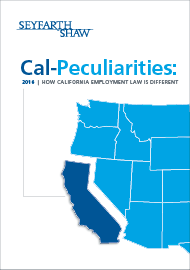 Seyfarth synopsis: It’s here: the 2016 edition of the popular and informative Cal-Peculiarities: How California Employment Law is Different. Order it here. Also, we report the results of our recent reader survey. Wage-hour Issues and Employment Termination were top of mind. Read on for more results.
Seyfarth synopsis: It’s here: the 2016 edition of the popular and informative Cal-Peculiarities: How California Employment Law is Different. Order it here. Also, we report the results of our recent reader survey. Wage-hour Issues and Employment Termination were top of mind. Read on for more results.
FLEX YOUR PECS!
We are thrilled to announce that the 2016 edition
Continue Reading Things Are About to Get Cal-Peculiar! The 2016 Edition of Cal-Peculiarities is Here

